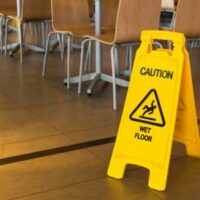Can A ‘Wet Floor’ Sign Affect My Slip-And-Fall Lawsuit?

If you’ve recently suffered a slip or fall accident, you may be overwhelmed and struggling with serious medical issues. Slip-and-fall accidents are the leading cause of traumatic brain injuries and can cause a number of debilitating and permanent conditions, including paralysis and damage to the spinal cord and surrounding vertebrae. These injuries may be especially hard to accept if you suffered them as the result of someone else’s negligence or recklessness. If you slipped and fell in a store, business, or private residence, you may be able to bring a premises liability claim to recover for the harm you suffered.
Understanding Premises Liability
Premises liability law varies by state. In Florida, the duty that people owe you when you are on their property differs depending on their relationship to you, your reason for being on their property, and their knowledge of your presence and of the hazard contributing to your injury. For instance, a homeowner does not owe the same duty of care to a trespasser as they do to an invited guest. There are essentially three tiers of visitors under Florida law: invitee, licensee, and trespasser. The most common example of a licensee is a shopper in a store. They are invited into the store on the understanding that they may purchase a product or service. However, their presence also benefits the shop or business owner. This differs from a licensee, who is present on a property for their own benefit. For instance, a dinner guest is a licensee because they are there for the benefit of getting dinner.
‘Wet Floor’ Sign and Premises Liability
Wet floor signs are almost always relevant in instances in which invitees slipped and fell in a store, restaurant, or commercial location. Business owners have a duty to invitees to keep their premises safe and to warn invitees of any present dangers. However, business owners are not obligated to warn of dangers that they had no way of knowing about. They are required to make reasonable and frequent checks of the premises. This is where the wet floor sign comes into play. If a customer slips on a spill that appears to be partially dry or within view of an employee, this can indicate that the business had sufficient time and should have been aware of and addressed the hazard. If the spill is accompanied by a wet floor sign, this tends to indicate that the business was aware of the risk and took action to warn invitees. However, if there are indications that the sign was placed a while ago and that nothing else was done to mitigate the risk, this may not impact your ability to bring a claim. Likewise, if the sign was placed out of view or only on one far end of an aisle, the warning may not be found to be sufficient.
‘Wet Floor’ Sign and Comparative Negligence
If you bring a slip-and-fall claim involving a wet-floor sign, be prepared for the other side to argue that you are partly or wholly at fault for ignoring the warning. Florida applies comparative negligence law, which means that the negligence that each party contributed to the overall harm will be assessed in each case. In the case of a store that became aware of a leak at 11:00am, placed a wet floor sign by it at 11:30am, and then took no other action to remedy the leak until a fall occurred at 2:30pm when a customer slipped and fell on the stagnant water. The customer said she did not see the sign because she was looking at her grocery list. In this case, the court may find the store 75% liable for the harm, and the customer 25% liable. If the court finds total damages to total $10,000, the customer will receive $7,500 ($10,000 – 25%). An experienced personal injury lawyer will be prepared to fight against their defense and maximize the proportion of fault assigned to the other party.
Talk to a Florida Personal Injury Lawyer
If you have been injured in a Florida slip-and-fall accident, the experienced Kissimmee personal injury lawyers at Draper Law Office are here to help. Call today to schedule a free consultation and find out how our lawyers will fight for the best possible outcome in your case, and the maximum settlement that you are entitled to.
